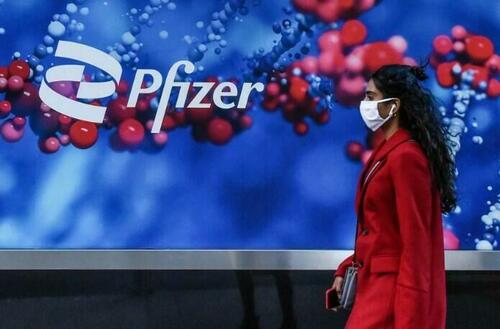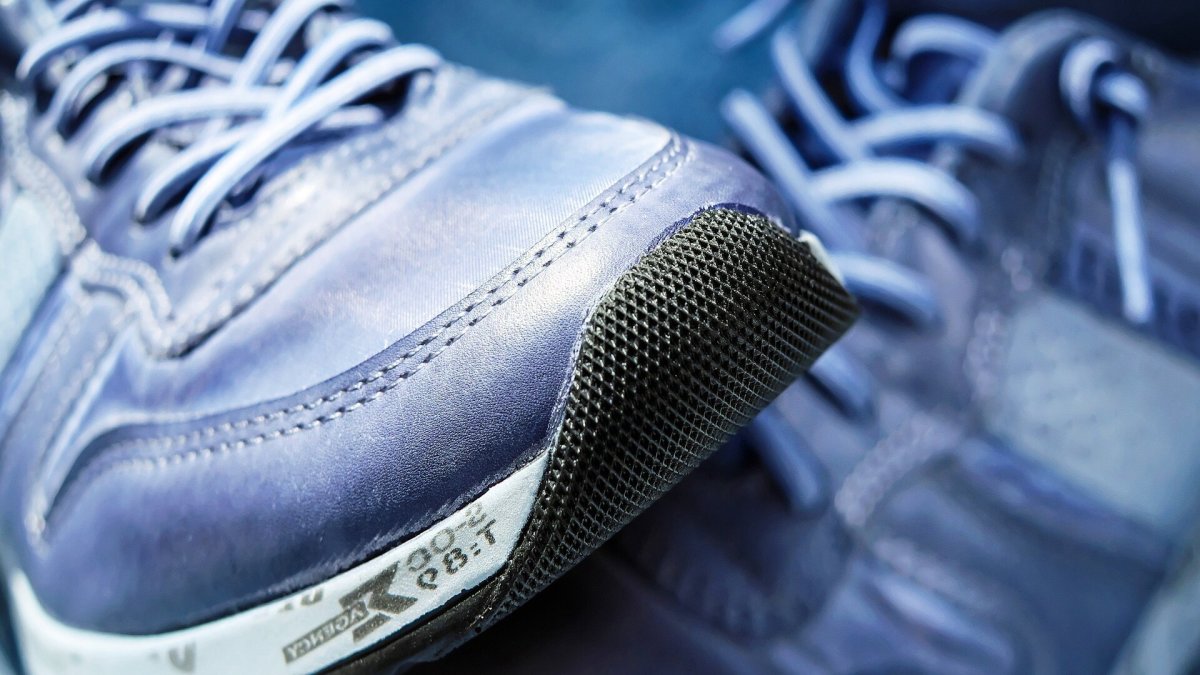Uncategorized
Pfizer’s Own Study Confirms Paxlovid Sucks
Pfizer’s Own Study Confirms Paxlovid Sucks
A Pfizer-funded, peer-reviewed paper authored by Pfizer scientists reveals that the company’s antiviral…

A Pfizer-funded, peer-reviewed paper authored by Pfizer scientists reveals that the company's antiviral COVID medication Paxlovid completely sucks, confirming what everyone's known since it came out.
In a randomized phase 2-3 trial of the drug conducted between Aug. 25, 2021 through July 25, 2022, 654 out of 1,296 patients were dosed with at least one 300mg dose of Paxlovid + 100mg of protease inhibitor ritonavir vs. a placebo group. The results showed that the median time until COVID-19 symptoms ended through day 28 was 12 days in the treatment group vs. 13 days in the placebo group.
According to the authors, the result of the drug, which is also known as nirmatrelvir, "was not significant."
"Similar results were observed in the high-risk subgroup (i.e., participants who had been vaccinated and had at least one risk factor for severe illness) and in the standard-risk subgroup (i.e., those who had no risk factors for severe illness and had never been vaccinated or had not been vaccinated within the previous 12 months)," the authors added.
And while 0.8% of the Paxlovid group suffered 'hospitalization or death' vs. 1.6% of placebo recipients, the authors also concluded that it was not statistically significant, however placebo recipients had longer average hospital stays and were more likely to be admitted to intensive care units.
According to the authors, "the usefulness of nirmatrelvir–ritonavir in patients who are not at high risk for severe COVID-19 has not been established."
The trial included adults who had tested positive for COVID-19 and shown at least one symptom, had previously received the COVID-19 vaccine, and had at least one risk factor - such as being a cigarette smoker.
Pfizer had previously announced that they were halting enrollment in the trial over "a very low rate of hospitalization or death observed in the standard-risk patient population."
Paxlovid was previously found not to reduce the risk of long COVID either.
As the Epoch Times notes, Dr. Vinay Prasad, an epidemiology professor at the University of California, San Francisco, who was not involved with the research, said on social media platform X that the trial showed Paxlovid "doesn’t work in vaccinated people."
"It was embarrassing to watch the administration and many ID doctors recommend this without any credible data," he continued - criticizing the government for spending upwards of $12 billion for Paxlovid "without much trial data."
A previous Pfizer trial, which was run to assess Paxlovid’s efficacy and safety among the unvaccinated, found that Paxlovid shortened the time to sustained symptoms alleviation and reduced the severity of COVID-19 symptoms. The trial enrolled people with COVID-19, with symptoms, and who had a risk factor for progression to severe disease or were 60 years of age or older.
Based on the results from that trial, the U.S. Food and Drug Administration in 2023 authorized the drug for both unvaccinated and vaccinated adults with mild to moderate COVID-19 who were deemed at high risk for progression to severe COVID-19. -Epoch Times
"The benefit observed among unvaccinated high-risk persons does not extend to those at lower risk for severe COVID-19," wrote Drs. Rajesh Gandhi and Martin Hirsch in an editorial about the new paper. That said, they also concluded that "it still appears reasonable to recommend the drug to older people and people with substantial underlying conditions."
What?
Uncategorized
Judge offers early win for Arbutus as Moderna vaccine patent spat heats up
A Delaware federal judge has sided with Arbutus’ interpretation of three patent claim terms in its case against Moderna, giving the biotech a small win…

A Delaware federal judge has sided with Arbutus’ interpretation of three patent claim terms in its case against Moderna, giving the biotech a small win in a drawn-out patent dispute.
Arbutus and Genevant filed suit against Moderna in 2022, alleging the company’s historic mRNA vaccine used lipid nanoparticle (LNP) technology developed and patented by Arbutus. While plaintiffs agreed that the Covid-19 pandemic would have been “immeasurably worse” without the widespread availability of Moderna’s vaccine, they argued that the achievement was made possible by Arbutus’ discoveries around LNPs.
LNPs are bubbles of fat that protect and escort mRNA into cells. Arbutus said its technology was “developed with great effort and at great expense,” and is now seeking royalties on Moderna’s Spikevax sales. The vaccine generated $6.7 billion last year alone.
Judge Mitchell Goldberg, who rejected Moderna’s effort to toss the case last year, issued an opinion Wednesday on arguments around the interpretation of several patent claims. The judge sided mostly with plaintiffs, giving Arbutus a potential advantage in the overall case. Goldberg sided with Moderna on one of the terms. Arbutus’ stock $ABUS rose nearly 16% on Wednesday.
“We are pleased with how the Court construed the disputed claim terms,” Arbutus interim president and CEO Michael McElhaugh said in a news release. “We remain committed to protecting and defending our intellectual property and look forward to the next steps in the litigation.”
Jefferies analysts said Wednesday that the opinion bodes well for Arbutus, and “should help derisk” a trial coming next year.
Moderna denied infringement of Arbutus patents in a statement to Endpoints News on Thursday, adding that its LNP system is “the result of our independent research and development.”
“We are confident in our position and look forward to presenting our case at trial next year,” the spokesperson said.
Arbutus and Genevant filed similar claims against Pfizer and BioNTech last April. That case is ongoing.
vaccine pandemic covid-19Uncategorized
Popular shoe brand files for Chapter 11 bankruptcy
The company has between $500,000 million and $1 billion in debt.

Competing in the footwear space has traditionally been incredibly hard.
That's because in the casual and sneaker space, Nike has dominated so thoroughly. It's a situation where to be a successful shoe company you need a niche.
The challenge of filling a niche is that you're still competing for mindshare and shelf space with much larger players. It's a very competitive market where there have been a lot more British Knights and LA Gears than there have been companies that have made it.
Related: Struggling mall retailer could file for Chapter 11 bankruptcy
Skechers and Crocs, for example, managed to stake out territory that was underserved by Nike and other casual footwear players. Both companies had to spend a lot of money to carve out their niche, and it's fair to say that both remain financially vulnerable.
It's a market that has been littered with failures and companies that have invested millions, sometimes hundreds of millions to not make much of a dent. Under Armour (UA) , a challenger to Nike in many areas, has failed to make its mark in sneakers despite a high-profile partnership with Steph Curry,
Breaking into the market presents huge challenges, but it can be equally difficult to stay afloat. A handful of brands, like the aforementioned British Knights, had viral moments, but then quickly fell out of fashion.
That's not exactly what happened with Shoes for Crews, a brand founded in 1984 that found a niche and filled it well. The company, however, has hit a major inflection point where its survival is not assured.
Image source: Pixabay
Shoe company fills a need
Shoes for Crews may not be a name everyone knows, but it has been a strong player that provides much-needed products. The company may not be as high-profile as other footwear makers, but it serves a major need for its customers.
"40 years ago, our founder Stan Smith noticed a rise in workplace injuries caused by slip and falls and discovered a need to create a solution that would eliminate the problem. In 1984, the Shoes For Crews brand was formed, and our slip-resistant outsole technology was invented," the company shared on its website.
Any company that has operated that long and Shoes for Crews has built a large following.
"Since then, we’ve protected millions of workers and lowered workers’ compensation costs for thousands of businesses across the globe. Today, Shoes For Crews is the industry standard and trusted leader in safety footwear solutions for more than 150,000 companies around the world," the company added.
Shoes for Crews files Chapter 11 bankruptcy
Shoes for Crews filed voluntary petitions for Chapter 11 relief in the United States Bankruptcy Court for the District of Delaware. The filing includes a plan for a "value-maximizing sale transaction that will allow for the continued operation of the business, with the resources to invest in growth across key markets globally."
The company reported in the filing that it had $100 million in assets and $500 million to $1 billion in liabilities.
Shoes for Crews Chief Financial Officer Christopher Sim said “a confluence of factors” led to the Chapter 11 bankruptcy filing.
"They include inflation; a general downturn in retail; a shift away from brick-and-mortar shopping to online buying; and the pandemic, which forced retailers to eat the expense of supporting brick-and-mortar assets," Retail Dive reported.
“Over time, these factors have tightened the Debtors’ liquidity and complicated their vendor relationships, culminating in a liquidity crisis by the fourth quarter of 2023, when the Debtors faced dwindling cash flows and the inability to access even incremental liquidity,” Sim said.
Shoes for Crews shared in its bankruptcy filing that it has the support of its first lien-secured lenders and that it has entered an agreement to receive $30 million of debtor-in-possession financing. That would, according to a press release allow the company to continue its normal operations.
"The company intends to enter into a stalking horse asset purchase agreement with its first lien-secured lenders to sell the business and enable the continued operation of the business as a going concern under new ownership," the company shared.
In the "Stalking Horse" process, the court will supervise the sale process to make sure Shoes for Crews gets the "best bids" possible to maximize value for all stakeholders. The process is expected to take two months.
bankruptcy pandemicUncategorized
Essential drug company to liquidate in Chapter 11 bankruptcy
The biopharmaceutical company will liquidate in Chapter 11 bankruptcy after sale.

Bankruptcy filings in the healthcare sector rose significantly over the last three years, rising from 25 in 2021 to 46 in 2022 and 79 in 2023, which was the highest level in five years, according to a Gibbins Advisors report.
For the first two months of the year, bankruptcies rose from about five filings in January to 12 more in February, according to data from S&P Global Market Intelligence. The most notable Chapter 11 filings in February were Cano Health, which filed on Feb. 4 with over $1 billion in assets and liabilities, and Invitae Corp., which filed on Feb. 13 with $500 million to $1 billion in assets and over $1 billion in liabilities.
Related: Troubled wireless technology pioneer files Chapter 11 bankruptcy
Chapter 11 filings are not slowing down yet, as a major biopharmaceutical company that sells essential drugs for serious life-threatening diseases has filed for bankruptcy in April.
Parkinson's, multiple sclerosis drug company files bankruptcy
Pearl River, N.Y.-based Acorda Therapeutics (ACOR) , maker of Parkinson's disease and multiple sclerosis therapies, on April 1 filed for Chapter 11 bankruptcy in the U.S. Bankruptcy Court for the Southern District of New York with a restructuring support agreement backed by its ad hoc noteholder group that seeks a sale to stalking-horse bidder Merz Therapeutics for a $185 million bid and an eventual confirmation of a liquidation plan to wind down operations after a sale.
The drug company will also seek $60 million in debtor-in-possession financing to fund operations during bankruptcy from its ad hoc noteholders, consisting of $10 million available on interim approval by the court, $10 million provided on final approval and a roll up of $40 million in debt.
The debtor listed $266.2 million in debt and $108.5 million in assets in its petition.
Acorda, founded in 1995, markets its Ampyra drug, which improves walking in adults with multiple sclerosis. The company manages the production and distribution of the drug through a third-party contract with Pantheon Inc. The drug is known as Fampyra outside the U.S. and produced and distributed by Biogen International GmbH, though the parties' contract is set to terminate on Jan. 1, 2025.
The biopharmaceutical company's other product is Inbrija, the first and only levodopa inhalation powder approved by the Food and Drug Administration for intermittent treatment of episodic motor fluctuations in adults with Parkinson's disease treated with carbidopa/levodopa regimen. Catalent Massachusetts manufactures the drug under contract through 2030.
Shutterstock
Pharmaceutical company purchase failed to generate revenue
Several factors caused the company's financial distress, according to a declaration by CFO Michael Gesser, including the company's 2016 acquisition of Biotie Therapies for about $363 million, which did not generate any revenue for the company and instead had net operating losses of $120 million.
The company also suffered an adverse court ruling that invalidated several of its Ampyra patents, which allowed generic versions of the drug to enter the U.S. market in late 2018 and caused a rapid loss of substantial revenue, the declaration said.
Finally, slower than expected sales of its Inbrija drug, due to the Covid-19 pandemic and prescribing challenges had a material adverse effect of the company's business and the inability to invest in its pipeline of drugs and other development opportunities also harmed the company financially.
The debtor seeks to set a May 16 deadline for potential qualified bids for an auction to be held May 22. A sale hearing to approve a sale would be scheduled for May 31 if an auction is held and on May 24 if no auction is held.
Related: Veteran fund manager picks favorite stocks for 2024
bankruptcy bankruptcies pandemic covid-19 stocks treatment
-

 International2 weeks ago
International2 weeks agoParexel CEO to retire; CAR-T maker AffyImmune promotes business leader to chief executive
-

 Spread & Containment3 weeks ago
Spread & Containment3 weeks agoIFM’s Hat Trick and Reflections On Option-To-Buy M&A
-

 International4 weeks ago
International4 weeks agoEyePoint poaches medical chief from Apellis; Sandoz CFO, longtime BioNTech exec to retire
-

 International4 weeks ago
International4 weeks agoWalmart launches clever answer to Target’s new membership program
-

 Uncategorized3 days ago
Uncategorized3 days agoVaccinated People Show Long COVID-Like Symptoms With Detectable Spike Proteins: Preprint Study
-

 Uncategorized1 month ago
Uncategorized1 month agoEvidence And Insights About Gold’s Long-Term Uptrend
-

 International2 weeks ago
International2 weeks agoJapanese Preprint Calls For mRNA VaccinesTo Be Suspended Over Blood Bank Contamination Concerns
-

 Spread & Containment1 day ago
Spread & Containment1 day agoOura Ring launches genius new feature to take on Apple Watch

















